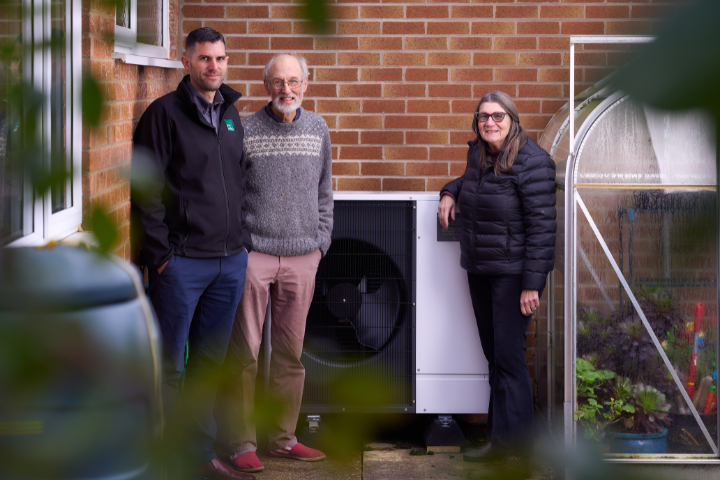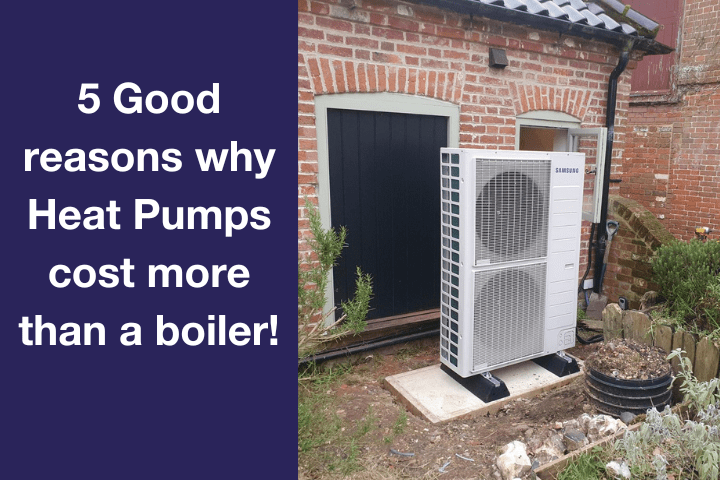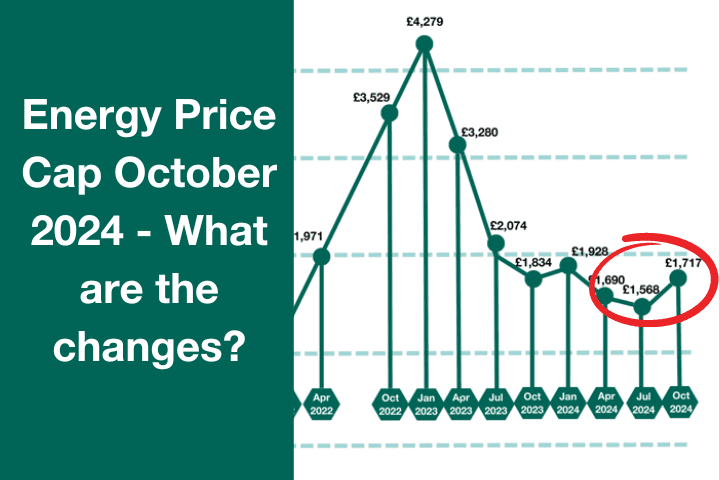Heat Pumps – 13 common myths about heat pumps that need busting

Last week, a few media outlets published an article about heat pumps. The content of the piece, we feel, included several common myths and misconceptions about heat pump technology, which could limit and directly affect people’s uptake of a technology that can save them money and reduce their environmental impact.
In this blog, we debunk 13 common myths we regularly hear about heat pumps and set the record straight on these highly-efficient pieces of technology.
Table of Contents
How do heat pumps work?
Air source heat pumps work by extracting heat from the air outside and using it to warm up the inside of your home. They are an incredible piece of technology, and they are a far more efficient and cost-effective way of heating your home than gas central heating. They can convert 1 kilowatt of electricity into 3.5 kilowatts of heat, meaning they are 350% efficient.
For comparison, an A-rated combination boiler can only turn 1 kilowatt of gas or oil into 0.9 kilowatts of heat, meaning they are 90% efficient. And they also have the added benefit of being more environmentally friendly. Let’s say that again; they are over three times more efficient than your gas boiler.
Let’s be clear: the future of heating our homes in the UK is not gas central heating. In 2025, no new houses can have gas boilers installed, and by 2035, gas boilers will no longer be allowed to be installed in homes due to the UK’s carbon reduction commitments. In the UK, we are over-reliant on gas for our heating; we have to find low carbon alternatives. Heat pumps are a viable solution to domestic heating.
However, many misconceptions about heat pumps remain. And this recent article, which was featured on the Daily Mail and This is Money websites is typical of the type of misinformation that can potentially damage customer perception of the technology. How do we know this? Because in the last few days, we have had conversations with potential customers who have been negatively influenced by the piece they read.
The reality, however, is that many customers, including our own, know just how good heat pumps are. You don’t have to take our word for it, either. In contrast to the recent piece, there is positive press coverage about heat pump technology and the customers embracing it, like here on the BBC.
You can get a government grant of £5,000 for an air source heat pump or £6,000 for a ground source heat pump through the government’s Boiler Upgrade Scheme (BUS). So, there is a real incentive to be a green pioneer and embrace the technology for your home, BUT many of these myths and misconceptions could be stopping you. With that in mind, it’s time to dispel the myths about heat pumps. Here are 13 myths about heat pumps busted!
Myth 1 – Heat pumps are complex or complicated to use
Once they are set up, the controller is similar to a regular boiler. Once the temperatures and heating periods are set, they can just be left to run automatically.
If your installer gives a handover session and explains everything correctly, they shouldn’t be more challenging to use. Many of our customers are not digital natives but, with the proper education, have been able to use the controls with no issues.
Myth 2 – Heat pumps need to run for long periods.
Heat pumps are not the same as gas boilers. We are all too familiar with ramping the boiler temperature when we want to heat our homes. This is different for heat pumps, but it doesn’t mean they must run for long periods.
Heat pumps operate at a lower flow temperature than a regular boiler; therefore, they take slightly longer to get a room up to temperature if it gets cold. However, the key to all heat pump installations is ensuring they are correctly sized for the house’s needs. Correct design and installation are critical to effectively running a heat pump system; they work perfectly well if done correctly.
Myth 3 – Heat pumps use electricity, which is much more expensive than gas.
Heat pumps generate much more heat than the electricity used to power them. Over a whole heating season, this is calculated as a Seasonal Coefficient of Performance (SCOP) and is a measure of the efficiency of heat out versus energy in. A modern gas boiler is 85-90%, and a heat pump is typically 350-400%. This means that at current prices, a heat pump’s operating cost is comparable with gas boilers and cheaper than others such as LPG, direct electric boilers, electric storage heaters or oil.
Myth 4 – Heat Pumps can only be installed in modern, well-insulated houses.
Homes with better fabric e.g. insulation and triple glazing, are more efficient. Heat pumps are more effective in a house where a fabric first approach has been taken, and heat loss has been reduced. A heat pump in more energy efficient homes can be smaller and run at a lower flow temperature. For a property with poor energy efficiency you will need to design an appropriate system.
There are still often solutions for older, less-well insulated homes. The key is conducting a room-by-room survey and calculating each room’s heat loss. The heat pump should then be sized to provide all the heat required for the house, and the radiators also need to be correctly sized to have enough surface area to provide the necessary amount of heat at the design conditions. These design conditions are specified under the Microgeneration Certification Scheme (MCS), which all reputable installers should be certified against.
A property’s insulation, or indeed size has no effect on a heat pump’s efficiency, (a more insulated property would require a smaller heat pump but would also be serviceable by a smaller boiler). A large house with poor insulation could have large radiators or underfloor heating and operate with the same efficiency as a smaller or better-insulated property with smaller radiators.
Improving insulation should always be a priority, however, once this has been done to the point where cost versus benefits has been reached, then a heat pump offers a viable green solution for inefficient properties. Understanding how your home is losing heat should be critical to any plans you have to make your home more efficient. Heat pumps, if correctly sized and installed, won’t fail your house for heating. But an inefficient house will fail a heat pump if the correct assessment hasn’t been done. Again too many people installing heat pumps are not sufficiently trained in this area and install the wrong size heat pump.
One potential pitfall is if a room has an open chimney flue. This massively increases the heat loss in a room so that it would require much larger radiators, or the flue should be blocked up. Blocking the flue would help the effectiveness of any heating system. If you live in a house with chimneys, but no longer plan to have a fire, blocking them will save you money.
We have successfully installed heat pumps in all types of houses, even poorly insulated solid brick or solid stone walled properties. The key is in the system design.
Myth 5 – Heat pumps are difficult to install
They are indeed more complex than a standard boiler installation, but if installed by a trained heat pump engineer, they are easy to fit. Many issues around heat pump installation arise from unqualified persons installing many of them. They buy a heat pump they don’t understand from a wholesaler, make mistakes during installation and often don’t follow the correct design process or conduct the proper thermal assessments beforehand. MCS-certified installers must install heat pumps, as we have at Green Building Renewables, who have followed the correct design and installation processes.
Myth 6 – You need to install lots of expensive insulation before getting a heat pump
Installing insulation benefits any heating system by reducing the heat required to maintain the desired temperature. Ensuring any cavity walls are filled and that lofts have enough insulation is the cheapest way to improve the heat performance of a home. These two measures are required for any application under the Boiler Upgrade Scheme (BUS)
Myth 7 -You need an EPC with a specific rating to be able to apply for the Boiler Upgrade Scheme (BUS)
This isn’t true. All you need is a current EPC, which does not recommend loft or cavity wall insulation. It does not matter if there are recommendations for solid wall insulation or room-in-roof insulation.
Myth 8- When they break, they are hard to fix
Heat pumps are far more reliable than gas boilers. They last longer but, like boilers, will benefit from regular checkups and services (if done by qualified heat pump engineers). Most heat pump issues are not related to the technology but to poor and incorrect installation. But it is true that they need to be maintained by qualified personnel and that there is a need for more suitably qualified installers. This situation is continually improving and is one of the reasons why at Green Building Renewables, we have our in-house training to help create the heat pump workforce of the future.
Myth 9 – Heat pumps are not suitable for terraced houses
This is not true. The Permitted Development rules stipulate that a heat pump must be installed at least 1m from the property boundary, so there can be challenges regarding where to site the outdoor unit for a terraced house. They can be installed less than 1m from the boundary, but a planning application would be required.
Myth 10 – Heat pumps are noisy
Modern heat pumps are quiet, with a sound level no higher than normal conversation. A properly installed heat pump should have a noise calculation done to ensure that the chosen location meets the regulations regarding the noise level at adjacent properties. If you have a noisy heat pump, it needs to be installed correctly.
Myth 11 – Heat pumps only work in warm climates.
This is one of the most common misconceptions about heat pumps. Many people believe that heat pumps only work in warm climates. However, this is not true. Heat pumps are designed to work in various climates, including cold climates. Heat pumps can work efficiently in temperatures as low as -15°C. Because water freezes at 0°C, there is still 273 degrees above absolute 0 kelvin, so there is still plenty of energy to extract even in colder climates.
Myth 12 – Heat pumps are expensive to install
While heat pumps do have a higher upfront cost than traditional heating and cooling systems, they can save you money in the long run. Heat pumps are more energy efficient than conventional systems, which means you will save money on your energy bills over time.
Myth 13 Heat pumps require a backup heating system.
Some people believe heat pumps require a backup heating system to work efficiently. While it is true that heat pumps can become less efficient in extremely cold temperatures, they do not necessarily need a backup heating system. Modern heat pumps are designed to work efficiently in various temperatures, and backup heating is not required if sized appropriately.
In conclusion, certified heat pumps are an excellent option for heating and cooling your home. Despite the common misconceptions and myths, they are designed to work in various climates, can provide both heating and cooling, and are efficient and cost-effective over time. If you are considering a heat pump for your home, be sure to research and consult a professional to determine if it is the right choice for your needs. At Green Building Renewables, we are happy to start a conversation with you about heat pumps for your home.




